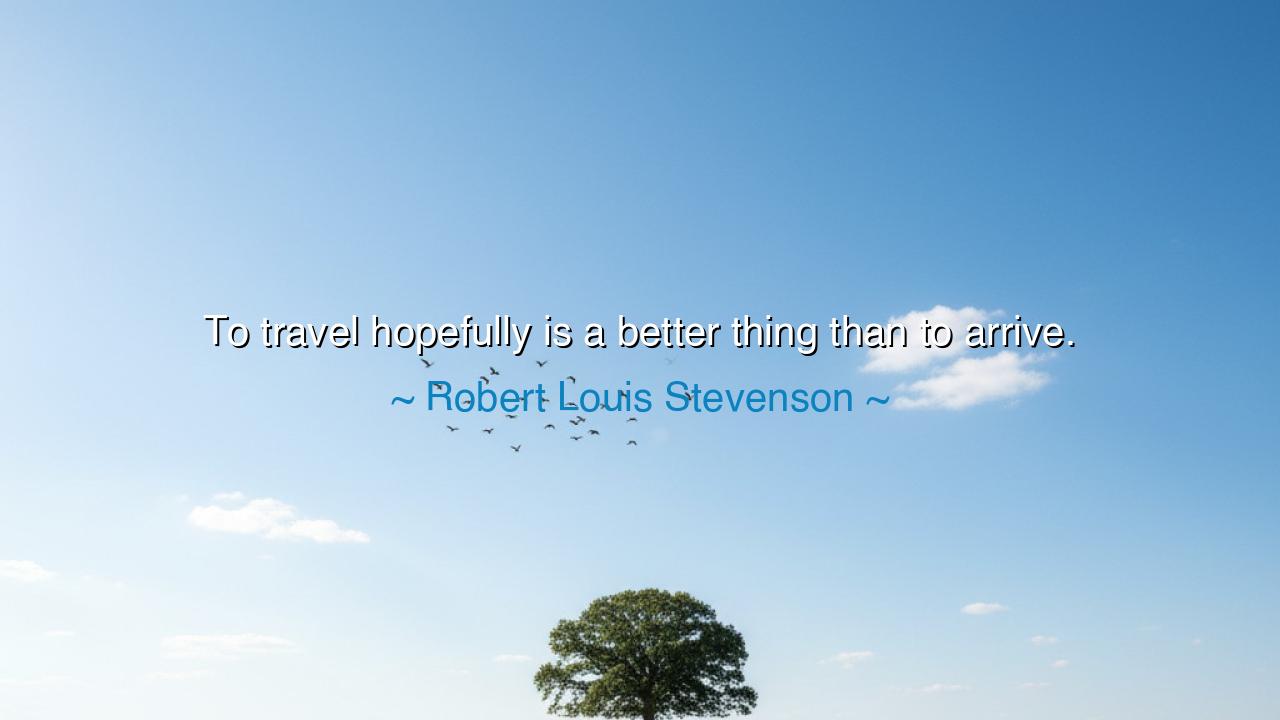
To travel hopefully is a better thing than to arrive.






Hear now the words of Robert Louis Stevenson: “To travel hopefully is a better thing than to arrive.” At first hearing, the mind wonders: how can the destination, the long-sought prize, be less than the road that leads to it? Yet here lies a deep wisdom, a teaching whispered by philosophers and poets across the centuries—that the true treasure of life is not the arrival, but the journey, not the end, but the hope that drives us forward.
For to travel hopefully is to live with the flame of expectation burning in the heart. Each step carries with it the promise of discovery, the delight of the unknown, the possibility that the next turn in the road may reveal wonder. The arrival, though sweet, is fleeting; but the days of travel, filled with anticipation, stretch long and rich. Thus, Stevenson teaches us to prize not only the achievement of goals, but the striving toward them—the discipline, the struggle, the joy of dreaming.
Consider the tale of Christopher Columbus. Though history judges him in many ways, we cannot deny the power of his voyage. His men feared the endless ocean, but he pressed onward, driven by a hope that land lay just beyond the horizon. The arrival in the new world changed history, but it was the voyage—the nights of faith beneath the stars, the days of courage upon uncharted waters—that defined the greatness of the moment. The true heroism was not in planting a flag upon distant shores, but in daring to set sail with hope when all others trembled.
So it is with every soul. The arrival—a diploma, a crown, a victory—lasts a moment. But the journey—the hours of study, the sweat of training, the sleepless nights filled with visions—this is the greater gift, for it shapes the character, strengthens the spirit, and gives life its meaning. Without the hopeful travel, the arrival would be empty, a hollow possession.
The ancients themselves understood this. Did not Odysseus wander ten years before Ithaca received him? And in those years, though filled with peril, he grew wiser, braver, more cunning. The arrival at last brought him peace, but it was the long journey, the hopeful endurance of storms, monsters, and temptations, that forged the man remembered through the ages. Thus Stevenson echoes Homer: the glory of life lies not in reaching the end, but in walking the road with hope.
The lesson for us is clear: let us not live only for outcomes. Do not wait to rejoice until the prize is in hand; rejoice also in the striving, in the slow and hopeful march toward it. For each day of labor, each step of the road, is already a fulfillment. If you seek happiness only at the arrival, it will flee from you quickly. But if you find joy in the hopeful travel, you will be rich every day of your life.
Practically, this means: set your goals, yes, but do not despise the process. If you learn, delight in the act of learning. If you train, delight in the sweat and struggle. If you dream of distant lands, savor the anticipation as much as the voyage itself. By living in hope, every day becomes luminous, every effort sacred.
Therefore, O traveler upon the road of life, do not rush only toward the destination. Walk with hope, with wonder, with joy in the journey. For as Stevenson has taught, to travel hopefully is greater than to arrive—and in this wisdom lies the secret of a life well lived.






AAdministratorAdministrator
Welcome, honored guests. Please leave a comment, we will respond soon